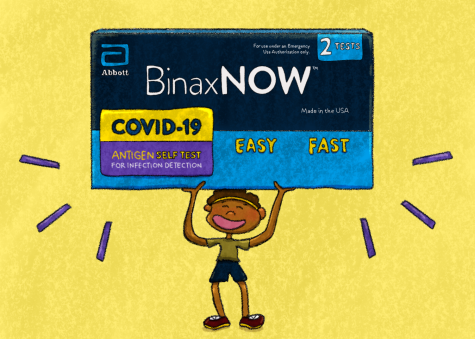Feds roll out third round of COVID-19 tests; Columbia backs both at-home and on-campus testing
June 14, 2022

Since the beginning of the pandemic, Olivia Brunell, a junior audio arts and acoustics major, has had to quarantine three times, two of which she spent at her home in Norwood Park and the other in Columbia’s on-campus housing in October 2020.
After spending days in the University Center self-isolating and dealing with the early kinks of Columbia’s quarantine program, Brunell never wanted to repeat it, calling it “one of the worst experiences” of her life.
Brunell said she did not know the government was giving out free COVID-19 tests until the second round in spring 2022, but once she found out in March, she ordered tests right away.
“The first four [COVID-19 tests I ordered] were very helpful if I was kind of feeling out of it, just to know for sure that night that I didn’t have it,” Brunell said.
Brunell said she will “definitely” be ordering more federal COVID-19 tests now that they are available.
The White House announced on May 17 that households can now order up to eight more at-home tests from the federal government, marking the third round of free tests for Americans to order.
Since the return of students on-campus during COVID-19, Columbia has offered free on-campus COVID-19 tests for students along with guidelines for when a negative on-campus test was required in order to return to campus.
Columbia’s Chief of Staff Laurent Pernot said the school welcomes the use of at-home tests, as opposed to solely testing on campus.
“We welcome the federal government making testing more accessible and convenient,” Pernot said in a May 18 email to the Chronicle. “Many members of our community have utilized at-home tests to get diagnosed, which has helped avoid campus close contacts and jump-started contact tracing, keeping the campus safer.”
While Pernot is supportive of home testing, he reminded the Columbia community that on-campus testing is still required for those needing proof of a negative test result before returning to campus.
“Members of our community who are required to do surveillance testing due to their vaccination status or who are required to test based on masking exceptions are still required to use on-campus testing instead of at-home testing,” Pernot said.
According to Pernot, the college also reserves the right to ask employees and students to follow up an at-home test with an on-campus clinical test, especially in the event of someone who is symptomatic of COVID-19, but tested negative on an at-home test. Pernot added that per CDC instruction, a PCR test is required in the event a rapid antigen test appears negative on a symptomatic person.
According to Columbia’s COVID-19 case update page, which tracks positive tests on campus week-by-week, more students who reported receiving a positive test result were from non-Columbia testing sites. For example, during the week of May 23, four positive COVID-19 tests were reported to the school, however, only one of those tests was through the campus’s testing system.
Despite this, Pernot said there has not been a drop-off of on-campus testing, according to a June 1 email to the Chronicle.
There were only two COVID-19 cases on campus documented for the reporting week ending June 12, according to the college’s case update page.
Pernot said if Columbia determines a student has close contact with someone who tested positive for COVID-19, that individual is required to take an on-campus test, whereas an at-home or a self-administered test is not accepted.
“We have encouraged people with symptoms to test negative before coming to campus; home testing is a helpful tool in this regard,” Pernot said. “We saw a smaller proportion in the latter part of the semester of people being positive who had come to campus with symptoms thinking maybe it was other than COVID; home tests are one likely reason and that’s something we support.”
Free at-home and self-administered COVID-19 tests can be ordered at www.covid.gov/tests.







